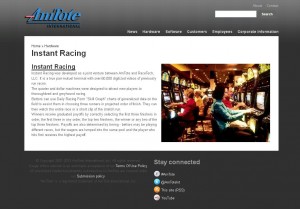Below is a screenshot of how gambling interests describe instant racing machines. Even though anyone can see that these machines are little more than an extension of slot machines, gambling interests continue to describe them as “pari-mutuel betting”.
Type
Memo outlining the case against instant racing machines
Below is a memo that outlines the case against instant racing machines. This is a great read to become more educated on the topic of instant racing machines, how they work, and how the are different from conventional horse-race betting.
Investigation finds Champions League soccer match was fixed
An investigation by Europol, the law-enforcement agency of the European Union, has found that a Champions League soccer match in the UK which ended in a tie was fixed. Europol did not release the identity of the match due to the ongoing investigation, however, they did say the match occurred within the last “three or four years”. Officials say this match-fixing is the work of an organized crime group based in Asia. This article from BBC Sport examines the investigation and its findings.
Match-fixing -Champions League tie played in England was fixed
Casino data can be used to spot and prevent problem gambling….but casinos purposely don’t do it
According to this article from The Wall Street Journal, the same data casinos use to track customers’ gambling habits can be used to identify gambling addicts. Casino customer-tracking information could create computerized models that can spot and warn people with high risk profiles. But what do casino operators, who extract more than half their profits from addicts, think of the idea? “I think it’s a terrible idea,” said former Caesars head Gary Loveman.
Oregon Lottery’s claim about its advertising is false, says Politifact
This article from The Oregonian details the validity of the Oregon Lottery’s claim that they do not show people playing or winning video lottery terminals (VLTs) in their advertising. After combing through all the evidence and reaching out to Lottery officials for clarification, Politifact Oregon has determined that claim to be “false”. This is another example of the Lottery’s questionable advertising practices, and shows that they are often not upfront with their ads.
Politifact: Does the Oregon Lottery show people playing and winning video lottery games
Link found between problem gambling and family violence
A new study by the Problem Gambling Research and Treatment Centre at the University of Melbourne, Australia shows a strong link between problem gambling and familial violence. Fifty-three percent of problem gamblers reported some form of family violence in the past 12 months and Forty-four percent reported victimization in the home. These disturbing numbers show yet another effect of problem gambling, and shows further why more commercialized gambling isn’t a good thing. This HealthCanal study summarizes the study’s findings.
Problem gambling and family violence strongly linked says new study
Casinos drop big money to advertise online gambling
Online gambling was recently legalized in New Jersey. However, if you live in New Jersey, you probably already knew that considering the amount of money casinos recently spent on TV and radio ads, billboards, and Internet ads promoting online gambling and begging consumers to try it. This runs contradictory, however, to the argument casino interests used in getting online gambling legalized- that people are already gambling online anyway so why not legalize it? If people were really gambling online already, then why do casinos need to spend so much to promote it? This Newark Star-Ledger article describes the media blitz.
NJ casinos take over airwaves in online gambling marketing blitz
Casinos spend millions in promotional gambling credits to lure citizens back and lose more money
Casinos are spending more and more money on “free play” promotional credits, which lure players into the casino only to lose all the money from the credit plus some of their own cash. Casinos figure that if they send you a $25 free play credit and you come in to the casino and cash it in, by the time you leave you’ll have given back well over that $25. That is part of the reason why, according to this Press of Atlantic City story, casinos are now spending 40 cents of every dollar in profit on these promotional credits, to lure you in and take their money back.
Maryland casino fight sees influence of big money from casinos
A November 2012 ballot initiative in Maryland regarding casinos turned out to be one of the costliest in history, due to the influence of MGM Gaming on the pro-casino side, and Penn National Gaming on the other side who wanted to eliminate the potential competition. Both sides spent millions and millions of dollars flooding the airwaves and paying groups to do door-to-door campaigning, and voters in Maryland truly got to see what happens when big casino money gets involved in politics, muddying the will of the people and letting corruption creep into elections.
Politically connected firms hit jackpot in Maryland casino fight
Casino campaign groups are not what they seem
Everett United is a pro-casino group located in Everett, MA that paints itself as a grassroots organization, a group of citizens, that supports casinos. However, recent campaign filings show this “grassroots” group is funded largely by Steve Wynn, a casino mogul, who has pumped money into the group to support the cause. This invalidates the idea that this is a grassroots organization, as it is being propped up by casino interests.
In Everett, as in Eastie, casino campaign groups are not what they seem

